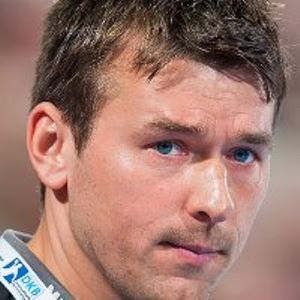

Led by new coach, Germany aim to remain modest
Led by new coach, Germany aim to remain modest
Two years ago, the injury-hit German ‘Bad Boys’ lifted the EHF EURO trophy in Krakow.
Now their new coach, Christian Prokop, remains humble when it comes to goals for the EHF EURO 2018 in Croatia, even though his side have been drawn into what looks like one of the easier groups in the preliminary round.
Opponents are three former Yugoslav teams: Montenegro, Slovenia and FYR Macedonia. Together with their final opponents from 2016, Spain, Germany have been the only side which won all six matches in their qualification group.
In contrast to 2016, Germany have hardly any injury worries. From his initial squad with 12 European champions, Prokop only had to replace Niclas Pieczkowski (shoulder injury) with Leipzig teammate Maximilian Janke.
While handball fans in Germany are hoping for a repeat of the 2004 and 2016 success and a third EHF EURO trophy, Prokop does not like to call the tournament in Croatia ‘mission: title defence.’ He rather talks about “intermediate goals” his team have to reach.
Roster
The top scorer of the Bundesliga 2016/17, Leipzig’s Philipp Weber, has been suffering from a foot fracture but reported fit and ready in time for the EHF EURO.
Several positions, like goalkeeper duo Andreas Wolff/Silvio Heinevetter and right wings Patrick Groetzki/Tobias Reichmann, seem to be clear.
Also, team captain Uwe Gensheimer and line player trio Patrick Wiencek, Hendrik Pekeler and Jannick Kohlbacher are confirmed for the EHF EURO.
Attack
Tactics haven’t changed much since the victorious EHF EURO 2016. Germany are counting on fast-break experts like Gensheimer and Reichmann/Groetzki, and on powerful back court shooters like Julius Kühn, Paul Drux or Kai Häfner.
Gensheimer and Reichmann are cold as ice from the penalty line, which might be another advantage for the Germans.
The only position with some question marks is the centre back: Steffen Fäth did not have a major impact at Füchse Berlin. Another option would be Drux as playmaker and Kühn as the classical shooter from the left back position.
If Weber is on 100 percent, he could be something like a shooting playmaker. Against powerful 6:0 defence sides, which is the usual way Balkan teams defend, the Germans can rely more on their line players; Wiencek and Pekeler are in truly strong form at the moment.
Defence
The goalkeepers Wolff and Heinevetter can win matches, as Wolff did in the 2016 final against Spain by saving close or even more than 50 percent of the shots.
As key players such as Wiencek and Pekeler are fit, the defence should be the key for a successful EHF EURO. “If we can cause turnovers, we are ready for easy counter-attack goals and we can use a huge rotation for nearly all defence positions,” Prokop says.
Germany can adapt the defence to 5:1 with Reichmann or Pekeler as ‘sweepers’ in front, but usually 6:0 will be the first option. “We need to have this ‘Bad Boys’ mentality in defence. Then we can go quite far,” right wing Groetzki says.
Coach
Prokop is a newcomer on international level. The 39-year-old coach has only eight matches on the German bench to his account prior to the final tests against Iceland.
But approaching his first major tournament and replacing the successful Sigurdsson does not put him under pressure.
Despite his young age, Prokop, who was named best German handball coach in 2015/16, has a lot of experience in leading a group of young players. Like Sigurdsson, he is known for this meticulousness and for analysis of opponents.
Working on a five-year contract, Prokop is supposed to lead Germany to medals at the home World Championship 2019 and the Olympic Games in 2020. But he is aware that he already has to deliver in Croatia.
Outlook
Germany face three ‘away games’ in the preliminary round against teams which bring a huge fan base to Zagreb.
If they stand the heat and proceed with the maximum four points, everything is possible.
Germany can be a medal contender, but they remain humble. They are in the other tournament half than hosts Croatia and world champions France, what could be an advantage.
Still, Germany will need some luck to make it to the semi-finals. They do not rely on a single top star and would even be able to compensate the loss of certain players because injuries.
The 16 players selected by Germany for the Men’s EHF EURO 2018:
Goalkeepers: Silvio Heinevetter (Füchse Berlin), Andreas Wolff (THW Kiel)
Left wings: Uwe Gensheimer (Paris St. Germain HB)
Left backs: Maximilian Janke (SC DHfK Leipzig), Julius Kühn (MT Melsungen), Paul Drux (Füchse Berlin)
Centre backs: Steffen Fäth (Füchse Berlin), Philipp Weber (SC DHfK Leipzig)
Right backs: Kai Häfner (TSV Hannover Burgdorf), Steffen Weinhold (THW Kiel)
Right wings: Patrick Groetzki (Rhein-Neckar Löwen), Tobias Reichmann (MT Melsungen)
Line players: Jannik Kohlbacher (HSG Wetzlar), Patrick Wiencek (THW Kiel), Hendrik Pekeler (Rhein-Neckar Löwen), Bastian Roscheck (SC DHfK Leipzig)





